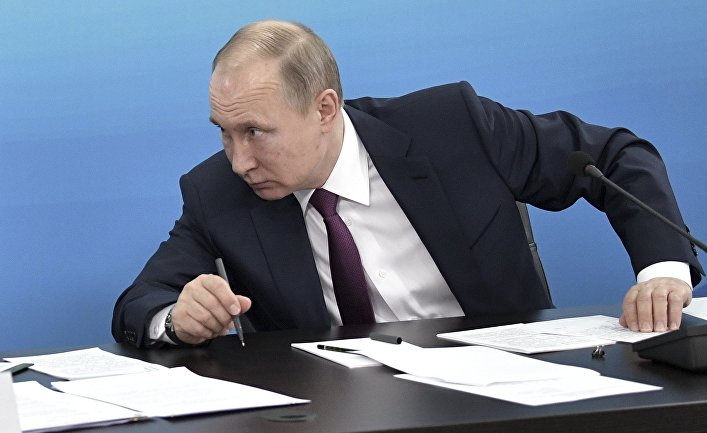
Russian President Vladimir Putin caused a tea-cup storm on the eve of a summit of the world’s 20 largest economies with this searing observation: “Every crime must have its punishment. The liberal idea has become obsolete. It has come into conflict with the interests of the overwhelming majority of the population”.
Western leaders lined up to condemn him. European Council president Donald Tusk sneered that he “strongly disagreed”.
“What I find really obsolete is authoritarianism, personality cults and the rule of oligarchs,” Tusk said.
Typical of EU heavyweights, Tusk prefers an idealised world to the real one. It is precisely this unwillingness to confront uncomfortable truths that has so many Europeans tearing at the bridle of their masters.
What is Donald Trump but a personality cult built on the rich foundation of a visceral reaction by many Americans to the dominant order? And what is Xi Jinping’s China if not an authoritarian regime that knows nationalism is a far more potent force than internationalism? While not agreeing with all of what he said, Australia can learn more from Putin’s brutal realism than from blinkered philosopher kings such as Tusk.
One of the mantras from Western leaders – save Trump – at the G20 was the need to preserve the “international rules based order”. In their telling of it this was hammered into place shortly after the Second World War under US leadership.
But from WWII until the fall of the Berlin Wall there was a cold world order, split between competing superpowers. The liberal order rose after 1989 – championed by the triumphant empire – and started to unwind during the financial crisis. It delivered many benefits but no Western leader ever acknowledged the costs.
In his essay Bound to Fail, American political scientist, John Mearsheimer argues the liberal international order was “destined to fail from the start, as it contained the seeds of its own destruction”.
“The liberal order’s tendency to privilege international institutions over domestic considerations, as well as its deep commitment to porous, if not open borders, has had toxic political effects inside the leading states themselves,” Mearsheimer writes.
“Hyperglobalisation, which sought to minimise barriers to global trade and investment, resulted in lost jobs, declining wages, and rising income inequality throughout the liberal world. It also made the international financial system less stable, leading to recurring financial crises. Those troubles then morphed into political problems, further eroding support for the liberal order.”
Putin saw it coming. In an aggressive, prescient speech taking aim at Europe’s rulers and their proselytising of the US-led order in Munich in 2007 he said: “It is a world in which there is one master, one sovereign. And at the end of the day this is pernicious not only for all those within this system, but also for the sovereign itself because it destroys itself from within.”
Now that the US sovereign king has abandoned the liberal order and the globalisation it spawned has supercharged the rise of China to challenge it, what does Putin see?
“The cold war was a bad thing …,” the Russian President told The Financial Times, “but there were at least some rules that all participants in international communication more or less adhered to or tried to follow. Now, it seems, that there are no rules at all.”
It’s time for a dose of Putin’s realism in Australia because it has to defend itself in this world without rules. And a realist must assume the worst case: that we will be acting alone in an increasingly dangerous region where a war between superpowers is a real and present danger. From now on we, and we alone, must defend our values, interests and borders in the physical and virtual world.
We must become a hard target. That demands much more be spent on defence and intelligence. Defence analyst Professor Hugh White has had the courage to open the debate on Australia acquiring nuclear weapons and that is what a realist would do. At the very least we should end the ban on developing a civilian nuclear capability. That opportunity presents itself when the Environment Protection and Biodiversity Conservation Act comes up for a 20 years review this year.
We must develop our capacity to disrupt adversaries offshore by building the cyber warfare capability of the Australian Signals Directorate and the human capital of the Australian Secret Intelligence Service.
We should fight to protect the US alliance but accept that our interests will not always converge. In the short term we cannot expect consistency from its mercurial President and in the long run shouldn’t live under the delusion that America can, or will, defend us if that time comes.
We must build better relationships with Japan, Indonesia and India, not to contain China but to push back in unison when the need arises. And the need will arise. We have belatedly begun stepping up to our responsibilities in the Pacific, but we should spend much more on foreign aid and soft power.
Critically, we must buttress our internal defences because Beijing has reached deep inside our Chinese diaspora, has cultivated or bought some elites and is interfering in domestic affairs.
Of course, we should hope for a better world but let’s prepare to deal with the real one.
Chris Uhlmann is political editor for Nine News.

 September 26, 2019
September 26, 2019  Опубликовано в
Опубликовано в